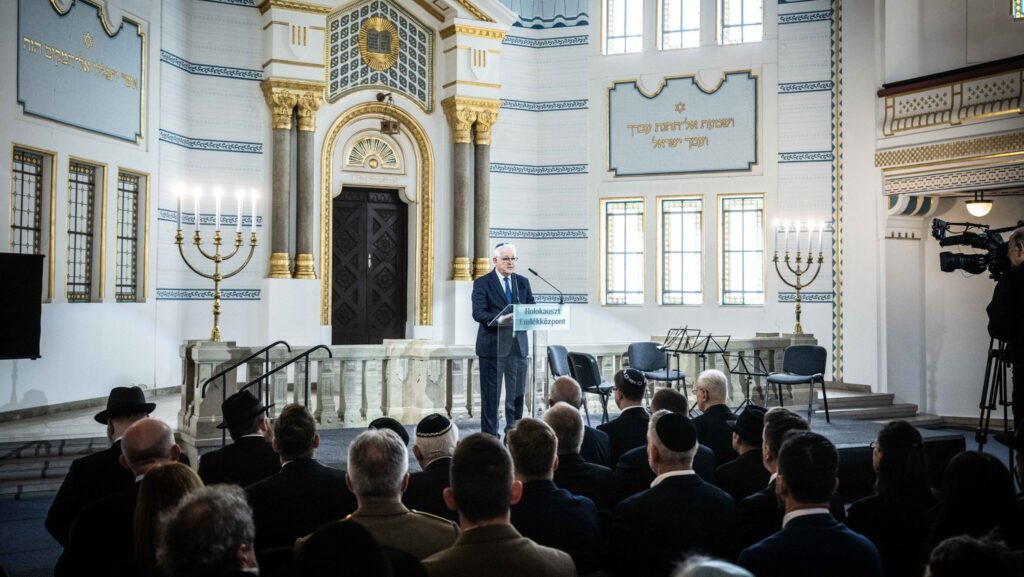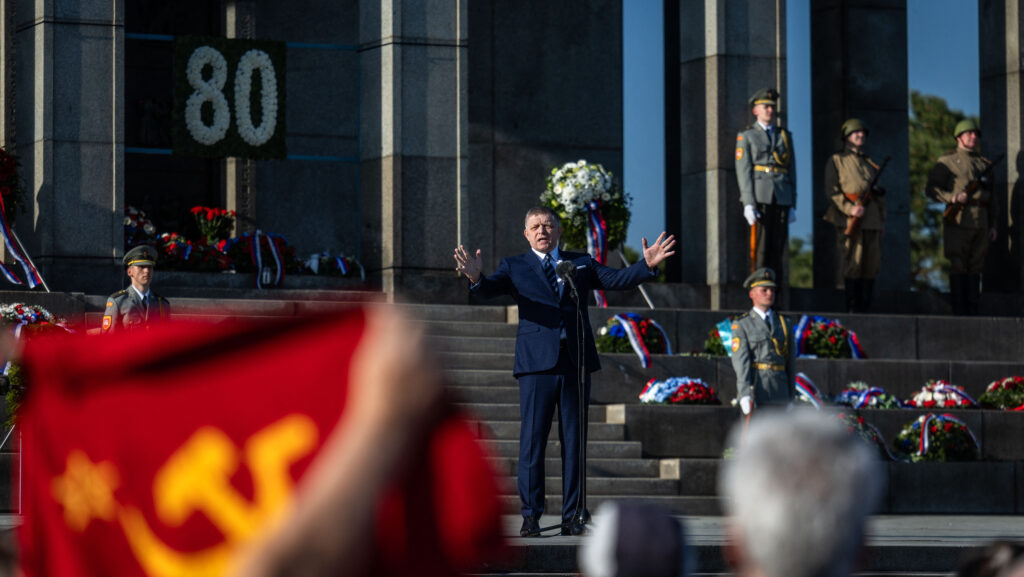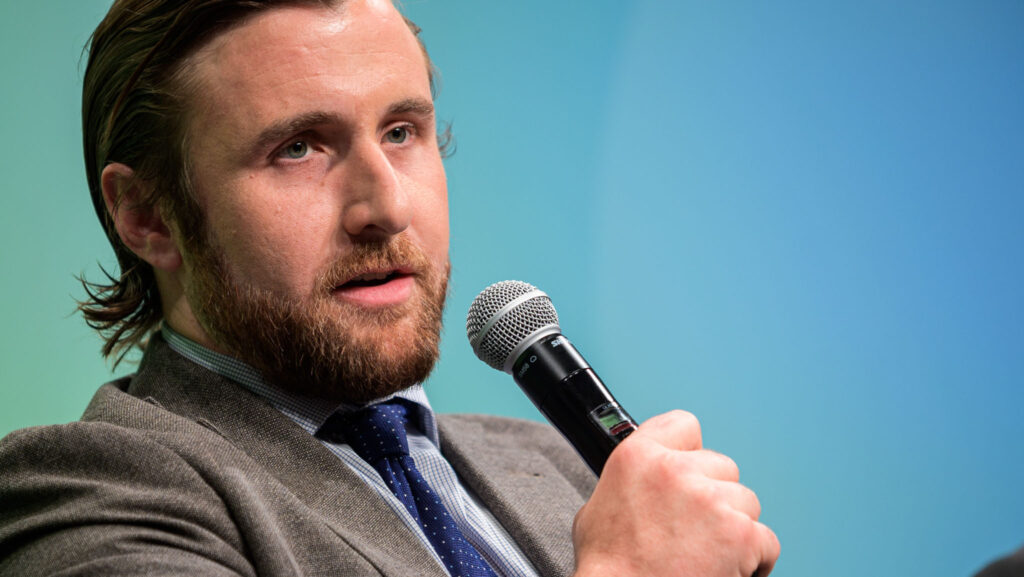A year on from the 7 October attacks, Israel has found itself fighting a war on two fronts; Hamas in the West, and Hezbollah in the North. Many predicted this would lead to chaos in the region and possibly a full-blown regional war, with retaliatory strikes exchanged between Israel and Iran threatening to spill over. But now, with the recent announcement of an Israel–Hezbollah ceasefire brokered by the Biden White House, the question arises: will the ceasefire hold? What are the underlying reasons for its conclusion? And how will Israel continue to steer its precarious situation as it enters the second year of a grinding war of attrition?
The guest of the new edition of the Danube Info podcast trying to answer these questions was Or Yissachar, who is a national security researcher and team lead in the Israeli high-tech industry, leading the Israel Defence and Security Forum‘s Content Division and Research Department. His research focuses on Iran, the Palestinian front, and Israel’s security strategy. He was also one the main organizers of the joint conference of the Danube Institute and the IDSF in Jerusalem on 9 September this year, titled The October Effect: Strategic Implications for Israel and Europe in the Middle East War.
Before discussing the main topics of the podcast, Yissachar gave an overview of the IDSF, highlighting that it was established by General Amir Aviv, who realized that there is only a single narrative in the security landscape of Israel represented by the military, Mossad, Shin-Bet and the police, which is not a reflection of what most Israelis believe. Therefore, he, along with fellow generals, founded the IDSF to broaden this conversation and ask the simple question, ‘What does Israel need for generations to come to thrive and exist in prosperity and security?’ The organization has grown into a grassroots movement with over 35,000 participants, starting with just ten members. Yissachar emphasized their efforts to engage the public, decision-makers, and young people, as well as their collaboration with both Israeli and international leaders, including the European Parliament, to raise awareness about Israel’s complex security challenges.
The Role of Hezbollah in Iran’s Radical Axis
In a recent IDSF research paper, which Yissachar co-authored, titled ‘Turning Point in the North: Prospects for the Israel-Hezbollah War’, the role of Hezbollah in Iran’s radical axis was explained. Regarding the question of how the weakening of Hezbollah, which came as a result of Israel’s all-out campaign, affects Iran’s regional ambitions, Yissachar highlighted that Hezbollah has long posed a grave threat to Israel, ranking as the number two threat following Iran’s nuclear ambitions regarding security challenges. Armed with over 150,000 missiles, rockets, drones and advanced weaponry, Hezbollah has accumulated an arsenal that is stronger than many national armies.
For years Israel relied on deterrence to avoid direct confrontation and an all-out war as it would have brought devastating consequences; however, this strategy let the threat metastasize, and on 7 October, the situation drastically changed. In recent operations, Israel brokered the 11-month-long stalemate on its northern border by launching an all-out campaign against Hezbollah in Lebanon. This has included over 4,000 airstrikes, the elimination of the vast majority of the terror group’s leadership, including Secretary General Hassan Nasrallah, and a limited ground incursion to confiscate weapons and remove the threat of terror tunnels. As Yissachar highlighted, this campaign underscored a critical lesson: when Hezbollah threatened, they meant it, and their ambitions should not be underestimated. As Yissachar raised attention to it just half an hour before the recording of the podcast, Hezbollah tried to break the ceasefire by placing rockets to launch to Israel, but the IDF managed to eliminate them. Israel’s approach reaffirms the need for Israel to defend itself by itself, supplemented by international alliances, to maintain strategic sovereignty and security in a volatile region.
Yissachar also explained that Prime Minister Netanyahu often emphasizes the broader threat posed by Iran and, therefore, views the Gaza conflict as one aspect of the ‘puzzle’. The expert highlighted that he frames the current conflict instead of the Israel–Hamas war as a larger Israel–Iran war, essentially a new Cold war, in which Russia, China, North Korea and Iran are on one side, and Israel, the US, the European Union, and the broader West are on the other. He pointed out that in this cold war, Israel and Ukraine are at the forefront, as both got drone hits by Iran. As the expert highlighted, this is why it’s called the Kyiv–Tel-Aviv axis, as both Russia and Hezbollah are supplied by Iranian drones.
‘Prime Minister Netanyahu often emphasizes the broader threat posed by Iran and, therefore, views the Gaza conflict as one aspect of the “puzzle”’
Regarding how the incoming Trump administration will affect the Israel–Hamas and Israel–Iran conflict, Yissachar highlighted that Trump will mostly focus on Iran, as for him, Gaza is a local issue that Israel has to resolve fast. Yissachar also pointed out Netanyahu noting that the Trump administration will give ammunition to ‘finish the job faster’. The expert also highlighted that the UN number of 43,000 Palestinians having been killed since 7 October is fabricated, as it comes from the Gaza Ministry of Health, which belongs to Hamas; thus it is a source that cannot be trusted.
Mass Migration and the Rise of Antisemitism in Europe
Yissachar also raised attention to the controversies around the United Nations Relief and Works Agency for Palestine Refugees in the Near East (UNWRA), and highlighted that it is a terrorist organization due to evidence of active Hamas connections among its staff and involvement in the 7 October atrocities. He argued that aid distribution through UNRWA enables Hamas to control resources and foster incitement, citing antisemitic materials in Gaza schools and propaganda that glorifies violence. Yissachar suggested replacing UNRWA with a humanitarian aid mechanism led by Israel, in collaboration with international organizations like the World Food Program, to ensure transparency and security. This approach, as he highlighted, is vital for dismantling Hamas’s control and addressing the broader challenges of incitement and terror in the region.
As the Hungarian Conservative reported on the evening of 7 November 2024, following a UEFA Europa League match between Maccabi Tel Aviv and Ajax in Amsterdam, Israeli football fans were subjected to violent attacks by pro-Palestinian assailants. The incidents resulted in at least ten injuries, with three individuals reported missing. Videos circulating on social media depict attackers wielding knives, clubs, and vehicles while shouting anti-Israel and pro-Palestinian slogans.
Regarding the question of whether rising anitsemitism is a result of mass migration, Yissachar highlighted that mass migration has contributed to the rise of antisemitism in Europe. He argued that Europe is in denial about the consequences of its migration policies, which have led to significant demographic changes without the democratic consent of its people. Although countries like Hungary and Poland resisted these shifts, understanding the risks of unregulated migration, others allowed millions to enter without consulting their citizens, transforming parts of Europe, with cities like Paris, Brussels, and Vienna experiencing dramatic cultural and social changes. Yissachar highlighted the rise of antisemitism as a concerning by-product, with Jewish communities facing hostility unrelated to Israeli policies. Protests across Europe often express outright hatred, such as calls to ‘gas the Jews’, rather than legitimate policy criticisms. Yissachar contrasted this with the treatment of other migrant groups, noting that Jewish people uniquely face backlash simply for their identity. The expert highlighted the inaction of European leaders and their attempts to satisfy domestic minorities, which emphasizes their failure to tackle the deeper issues confronting Europe.
Regarding Hungarian–Israeli relations, Yissachar noted the following: ‘Hungary is, I think, the strongest supporter of Israel in the world. It is quite remarkable to see that immediately after 7 October, Israeli flags flew all over Budapest and a major pro-Israel demonstration, including the Jewish community, the main rabbi, and the Israeli ambassador, was held. And we also saw it at the Danube Institute, where we are coming for conferences, and from where you come over to Jerusalem for conferences. And I just wish more countries in Europe looked like Hungary.’ The expert added that more European countries should follow Hungary’s example and recognize Jerusalem as Israel’s capital, as well as move their embassies there.
You Can Watch the Full Episode of the Danube Institute Podcast with Or Yissachar Below
“Hungary is the strongest supporter of Israel in the world” – Discussion with Or Yissachar
Sáron Sugár, a researcher at the Danube Institute, sits down with Or Yissachar, the Head of Israel Defence and Security Forum’s Content Division and Research Department, to discuss what lies ahead for Israel’s security strategy as tensions with Iran and its proxies continue to simmer.
Related articles:








